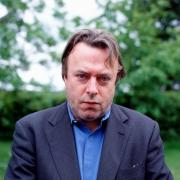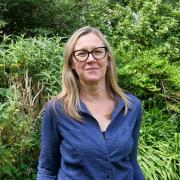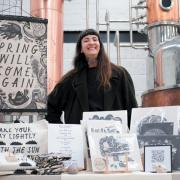The detective writer who chose Southampton as the setting for his dark novels tells Faith Eckersall why the city - and the New Forest beyond - are a perfect fit with his ‘fractured’ heroine, Detective Inspector Helen Grace
It’s happened to quite a few people in Southampton and the New Forest recently. There’s been a horrible murder down their road, or a body found in a lock-up on the industrial estate where they work. Thankfully they only find out when they read the books of Matthew ‘M.J.’ Arlidge, the thriller writer who has spent the past three years quietly turning Southampton into serial killer central.
From Eeny Meeny, the nerve-shattering tale of a sadist who likes their victims to choose who lives and dies, to his latest, Love Me Not, which begins with the slaying of a young mum on the A336 near Ashurst, Arlidge has put this area of Hampshire well and truly on the international crime map. He’s just returned from a signing in Greece: “I try and cherry-pick the nicer locations to go and publicise, I keep trying to get Brazil,” he says, cheerfully. “People thought the books wouldn’t sell well in Brazil because they have such bad crime in real life and tend to buy more escapist literature, but…”
But indeed. For Arlidge’s seven books about the charismatic, troubled Detective Inspector Helen Grace and her pursuit of the violent and the psychopathic have sold over a million copies around the world. Which leads me to the question his fans, especially those in this county, want answered. Why Southampton? “Because of the rich history of crime-fighting in this country, most cities and towns had their own fictional detective already,” he explains. “I spotted a gap in Southampton.” There are other reasons. “Southampton is a port city; I like ports, they have a unique atmosphere. All sorts of things, good and bad, come out of ports.”
More interesting still is his belief that it is a ‘fractured city’: “It was one of the most heavily bombed cities in the Second World War, it has a fractured identity. There are buildings which are ancient and historic and some which just had to be put up after the bombing. I quite liked the idea that Helen Grace, who is a rather fractured character, would ply her trade here.”
He also loves Southampton for its proximity to the New Forest, which he describes as a ‘great contrast’ and a ‘place to branch out to’ for his characters and crimes. “It’s great to have that mix of urban and rural; it’s atmospheric,” he says, breaking off to reminisce about the time he took some Dutch journalists to see the place on Calshot Spit where he buried the body in The Doll’s House.
When you ask what came first, however, Helen Grace, the S&M-loving, Kawasaki Ninja-riding, leather-clad DI or the city she lives in, the Hertfordshire-based author is not so sure. “I wanted a heroine for a number of reasons, partly because women are more interesting than men in life as well as in fiction. I pretty much know what my male friends are thinking this week and I know what they’ll be thinking next week, whereas women are more complex and nuanced.”
Life is harder for women, he believes, which makes them good fictional characters. For this reason he has two more strong, female presences: Charlie Brooks, the police officer who is ‘light to Helen’s dark’ and Emilia Garanita, the evil local journalist and Helen’s nemesis. Like all his characters she is not based on anyone in particular but: “I was writing my first book during the time of the phone-hacking scandal at a time when the Press were definitely in the dock.”
He says his readers care about Helen and, strangely, Emilia, who has a tragic back story which he intends mining for a future novel. Another characteristic of his novels is their fast pace – it’s not unusual for them to have more than 100 chapters each. Was this because of his previous training, writing scripts for TV dramas such as Silent Witness? “I didn’t really know how to write a novel so I did it like a screenplay – lots of short scenes, one thing happens and you move onto something else,” he says. “They are about a police officer but are not police procedurals, they are thrillers.”
His other scriptwriting technique helps too: “To generate pace you have to have three to five storylines going on at the same time and interweave them. I first started writing when I had a baby and a toddler and when you’re reading in bed when you have small children you are absolutely exhausted and feel lucky if you manage one chapter. If that chapter is only three pages then an achievement is possible and this kind of writing fitted my reading style.”
Although they are a series, he tries to do something different with each novel. “You cannot afford to take your readers for granted, you have to give them something a bit different, so in Love Me Not I decided to make the action take place over one day.”
That means that you can read it almost in real time, from the moment the victim is discovered on the A336 to a trail of slaughter that plays out across Southampton and as far away as Hedge End. Like all his books, it flies to a thrilling and satisfying conclusion – no wishy-washy literary musings here. “When I was a TV producer I read loads of books, thinking could we adapt them into something interesting for TV,” he says. “You’d get to the end and realise the writer didn’t know the ending before they wrote it. If you drag someone through 400 pages and you’ve delivered a disappointing ending that’s a bit of a crime.”
He starts from the end and works backwards: “The ending should be the point of the book, when the truth is revealed and you think ‘that’s what it was all about’.”
His next book, The Last Rites, will be set in the USA and he’s returning to Helen Grace later this year. So if you see a man loitering down your lane, don’t call the police immediately. It might be Matt Arlidge, sizing up its potential as a location for his next best-seller.
Love me Not by M. J. Arlidge is published in paperback in October
More…
• What celebrities love most about Hampshire - Some of Hampshire’s best known personalities have revealed what they most love about the county. Here, we compile some quotes from our interviews over the years



























